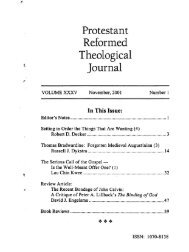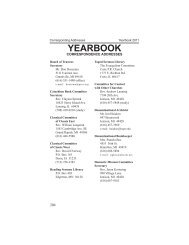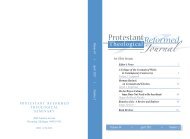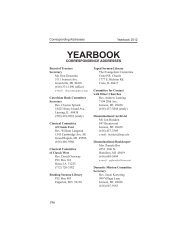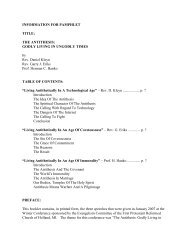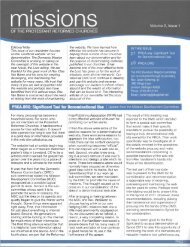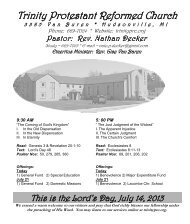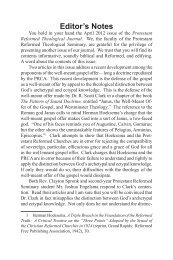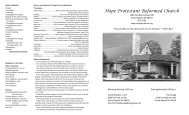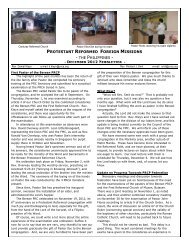November 2007 - Protestant Reformed Churches in America
November 2007 - Protestant Reformed Churches in America
November 2007 - Protestant Reformed Churches in America
You also want an ePaper? Increase the reach of your titles
YUMPU automatically turns print PDFs into web optimized ePapers that Google loves.
Preparatory Grace <strong>in</strong> the Puritans<br />
pared for regenerat<strong>in</strong>g grace. “Such op<strong>in</strong>ions,” writes Shedd,<br />
“must be given up and scriptural views must be adopted before<br />
the Holy Spirit will create a new heart.” 69 Even that may not be<br />
enough. If the “orthodox truth is held <strong>in</strong> unrighteousness,” that<br />
attitude must be changed too, so the s<strong>in</strong>ner is better prepared. 70<br />
After all that preparation, the s<strong>in</strong>ner hav<strong>in</strong>g become a “serious<br />
anxious <strong>in</strong>quirer” 71 and one who is “endeavor<strong>in</strong>g to believe on<br />
the Lord Jesus Christ,” 72 it is only “<strong>in</strong> the highest degree probable”<br />
for him, us<strong>in</strong>g common grace, to be saved. 73 Where is the<br />
comfort <strong>in</strong> that<br />
Herman Witsius (1636-1708) treats preparationism <strong>in</strong> The<br />
Economy of the Covenants. Witsius does not believe that a man<br />
can prepare himself for regeneration. S<strong>in</strong>ce the unregenerate are<br />
evil trees, they cannot produce good fruit (Matt. 7:18). Therefore,<br />
“unless a person can be thought to prepare himself for grace<br />
by s<strong>in</strong>,” preparationism cannot be admitted. 74 Preparationism, <strong>in</strong>sists<br />
Witsius, is a semi-Pelagian doctr<strong>in</strong>e. The semi-Pelagians<br />
taught that a s<strong>in</strong>ner can come to grace<br />
… by ask<strong>in</strong>g, seek<strong>in</strong>g, knock<strong>in</strong>g; and that, <strong>in</strong> some at least, before<br />
they are born aga<strong>in</strong>, there is a k<strong>in</strong>d of repentance, together with a<br />
sorrow for s<strong>in</strong> … a beg<strong>in</strong>n<strong>in</strong>g of faith, and an <strong>in</strong>itial love of God, and<br />
a desire of grace. 75<br />
That certa<strong>in</strong>ly sounds like the teach<strong>in</strong>g of some of the theologians<br />
that we have considered above. Witsius takes issue with<br />
the view of Perk<strong>in</strong>s. Concern<strong>in</strong>g his view he writes:<br />
69. Shedd, Theology, vol. 2, p. 518.<br />
70. Shedd, Theology, vol. 2, p. 518.<br />
71. Shedd, Theology, vol. 2, p. 518.<br />
72. Shedd, Theology, vol. 2, p. 528, italics added.<br />
73. Shedd, Theology, vol. 2, p. 526.<br />
74. Herman Witsius, The Economy of the Covenants Between God<br />
and Man Comprehend<strong>in</strong>g a Complete Body of Div<strong>in</strong>ity (P&R Publish<strong>in</strong>g:<br />
Phillipsburg, NJ, repr. 1990), p. 361.<br />
75. Witsius, The Economy, p. 363.<br />
<strong>November</strong> <strong>2007</strong> 75



